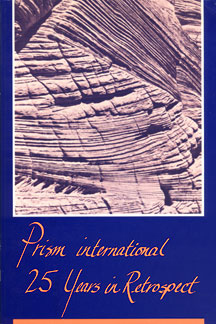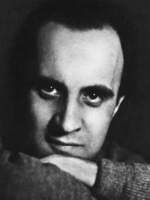Jesus Wants Nothing More
To Do With ItWolfgang Borchert
Translated from the German by E. J. Campfield
He lay cramped in the shallow grave. They were always plenty short so that he had to bend his knees. He felt the icy coldness in his back. He felt it like a little bit of death. He found that the sky was very far away. So horribly far away that one didn't want at all to say anymore, "God is great, God is good." His distance from the earth was horrible. All that blue sky up there did not make the distance seem any smaller. And the ground was so unearthly cold and sullen in its icy stiffness that he lay very cramped in the much too shallow grave. Was one supposed to lie so cramped his whole life long? Oh no, just his whole death long. That was indeed much longer.
Two heads appeared in the sky above the edge of the grave. "Well, how is it, Jesus?" asked the one head, and in so doing let escape from his mouth a white bundle of clouds like a wad of cotton. Jesus thrust out of his two nostrils two thin, equally white cloud pillars and answered: "Good enough, it'll do."
The heads in the sky disappeared. Like smudges they were suddenly wiped away. Without a trace. Only the sky was still there with its horrible distance.
Jesus sat up and the trunk of his body towered out of the grave. From afar he looked as if he were buried up to his stomach. Then he propped his left arm against the edge of the grave and stood up. He stood in the grave and looked sadly at his left hand. In standing up he had again torn open the recently mended finger of his glove. The frozen red finger tip stuck out here. Jesus looked at his glove and became dismayed. He stood in the much too shallow grave, breathed a warm cloud against his bare frozen finger and said softly: "I want nothing more to do with it." "What's wrong?" gaped one of the two who looked at him in the grave. "I want nothing more to do with it," said Jesus once again as softly as before and stuck the cold naked middle finger in his mouth."Hear that, sergeant, Jesus wants nothing more to do with it."
The other, the sergeant, counted the explosive charges in an ammunition box and growled: "How come?" He blew wet clouds out of his mouth at Jesus: "Hey, how come?"
"No," said Jesus still just as softly as ever, "I can't do this any longer." He stood in the grave with his eyes closed. The sun made the snow unbearably white. With his eyes closed he said: "Everyday the graves multiply. Every day seven or eight graves. Yesterday even eleven. And every day the people squeezed into the graves which never fit them. Because the graves are too small. And the people are usually frozen, bent and stiff. They crunch so when they are squeezed into these tiny graves. And the ground is so hard and icy and miserable. They're supposed to endure that their whole death long. And I, I can't listen to that crunching any more. It's like crushed glass. Like glass."
"Shut up, Jesus. Get out, get out of that hole. We still have to make five graves." The cloud from the mouth of the sergeant fluttered angrily away toward Jesus. "No," he said and thrust two fancy cloud pillars out of his nose, "No." He spoke very softly and with his eyes closed: "The graves are just too shallow. When spring comes, the bones stick up out of the ground everywhere. When it thaws. Everywhere the bones. No I don't want that any more. No, no. And always me. Always I'm supposed to lie down in the grave to see if it is suitable. Always me. I've started dreaming about it. That's horrible for me, you know, that I'm always the one who's supposed to try out the graves. Always me. Always me. After a while a person starts having dreams about it. That's horrible for me, that I'm always supposed to climb into the graves." He clambered out of the shallow grave and took four steps over to a dark heap. The heap consisted of dead men. They were twisted as if they had been taken by surprise in a confused dance. Jesus laid his pickaxe softly and carefully beside the heap of dead men. He could have just thrown the pickaxe down, the pickaxe wouldn't have harmed anything. But he laid it down softly and carefully, as though he didn't want to bother or awaken anyone. For God's sake don't wake anyone. Not just out of respect, but also out of fear. Out of fear. For God's sake don't wake anyone. Then he took off through the crunching snow for the village, past the other two as if they weren't even there. Repulsively, the snow crunched that same way, quite exactly that same way. He raised his feet and stilted like a bird through the snow in order to lessen the crunching.
Behind him the sergeant screamed: 'Jesus! You come back here immediately! I'm giving you an order! You come back to work immediately!" The sergeant screamed, but Jesus did not look back. He stilted like a bird through the snow, like a bird, in order to lessen the crunching. The sergeant screamed- but Jesus did not look back. Only his hands made a motion as he said: "Softly, softly! For God's sake don't wake anyone! I don't want that anymore. No. No. Always me. Always me." He became ever smaller, smaller, until he disappeared behind a snowdrift.
"I'll have to report him." The sergeant made a wet cottony bundle of clouds in the icy air. "It's clear, I must report him. That is dereliction of duty. We both saw it, and he is gone. I must report him."
"And what do you suppose they'll do with him?" grinned the other. "Nothing much. Nothing much at all." The sergeant wrote a name in his notebook. "Nothing. The old man will order him to report to his office. The old man has always gotten a kick out of Jesus. He bawls him out so that he won't eat or say anything for a couple days and lets him go. Then he is alright again for a while. But I still have to report him. Even though the old man likes him. And the graves must get made, too. Someone must get in to see if they are suitable. That doesn't help anything."
"How did he get to be called Jesus?" grinned the other. "Oh, there's no reason. I guess the old man named him that because he looked so gentle. The old man thought he looked so gentle. Since then his name is Jesus. But of course," said the sergeant and made another explosive charge ready for the next grave, "I must report him, for the graves certainly must get made."
Translation copyright ©1974, 2002 by E. J. Campfield. All rights reserved.

"Jesus
Wants Nothing More To Do With It"
appears here as originally published in
PRISM
INTERNATIONAL
Volume 19 · Number 2 · Winter 1980
The University of British Columbia
Vancouver, B.C.

...And
as republished in the anthology
PRISM
INTERNATIONAL
25 YEARS
IN RETROSPECT
Volume 23 · Number 2 · Winter 1984
The University of British Columbia
Vancouver, B.C.
